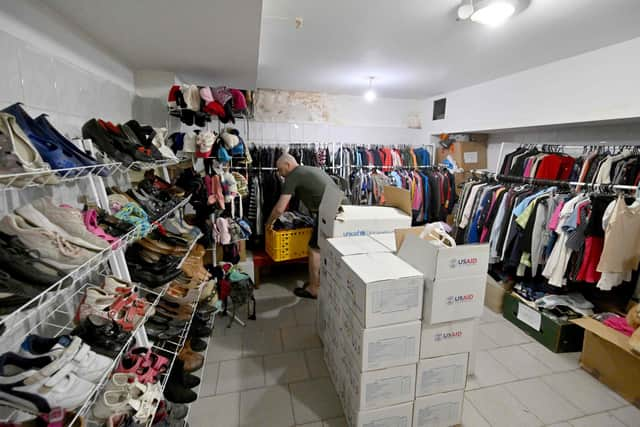Isn’t it time for sense to prevail and peace negotiations to start over the Ukraine war? - Patrick Mercer
But where does that leave both armies as they stare at each other across the ruins of this iconic town? First, we’ve got to put to bed the nonsense periodically peddled by both sides that Bakhmut is tactically unimportant.
It’s true, whilst the town is a transport hub and had been fortified as such by Kiev, it does not enjoy any particular dominance over vital ground. That significance belongs to the ridgeline beyond nearby Chasiv Yar which leads to the fortresses of Slovyansk and Kramatorsk and which will be the next arena for vicious fighting unless both sides come to their senses.
Advertisement
Hide AdAdvertisement
Hide AdNo, Bakhmut assumed a political importance far above its tactical significance.


Ukraine poured thousands of troops into its defence whilst Russia clawed her way relentlessly forward despite a shocking butcher’s bill. And this, of course, demonstrated the two protagonists’ different approach to this conflict like oil meeting water.
Kiev chose to hold the town as a totemic symbol and was prepared to throw her precious reserves into the maelstrom in order to keep it. Russia, meanwhile, called it a ‘meat grinder’ suggesting that Ukrainian hubris would allow them to use the town as a anvil upon which to hammer Kiev’s men by the thousand and, whilst it’s true that Ukraine’s casualties have been enormous, a bleak truth has emerged about Russia’s forces.
Bluntly, the only unit that appears capable of brutally storming targets such as Bakhmut is the privately owned mercenary outfit, Wagner.
Advertisement
Hide AdAdvertisement
Hide AdIt’s often - conveniently - forgotten that Wagner’s casualties are not reported in parallel with those of Russia’s regular army. Why?
Cynically, it’s because many of the Wagner troops are ex-convicts whose lives seem to be worthless and whose reward, should they live, is a pardon for their crimes. So, Russian casualty reports are skewed, but it does mean that the Kremlin has a sizeable assault force who care little for their own skins and attack with suicidal bravery.
But what happens next? With Bakhmut taken and the troops there exhausted, I suspect that Russia will hunker down onto the defensive to regroup for a while whilst the Ukrainians prepare for their long advertised counter attack.
Whilst we can expect many further missile and drone attacks against troop concentrations and materiel, I’m sure that President Putin’s men will now wait to see what their enemies will do.
Advertisement
Hide AdAdvertisement
Hide AdAnd that begs the question, what’s happened to this counter attack? Well, deputy defence minister Hanna Maliar announced in Kiev four weeks ago that this great operation had already started: the trouble is, no one’s noticed.
True, a couple of the newly formed and Western equipped ‘Storm Brigades’ have been used by Ukraine to nibble at the flanks of the Russians assaulting Bakhmut, but that feels more like an attempt to secure their comrades’ withdrawal rather than the start of something bigger.
Similarly, in the north a Ukrainian raid across the Russian border into Belgorod region has certainly distracted attention from the fall of Bakhmut, but this is only a pinprick which may save face and cause some reserves to be redeployed, but it doesn’t explain why the very substantial force of freshly equipped troops concentrated in the Zaporizhzhia area has yet to make a move against the Russians to their south. On the face of it there are some good reasons for the delay. President Zelensky’s said that his troops are not quite ready and it’s certainly true that the West has yet again defaulted on the delivery of most of the tanks, other armour and guns that they promised. It’s also true that an unusually wet spring has left the ground deeply muddy.
Dangerously, though, Ukrainian troops are now concentrating near their jumping off positions in full view of Russian satellites and drones and making themselves vulnerable to missile and bombing attacks.
Advertisement
Hide AdAdvertisement
Hide AdIn war it’s a tricky balancing act between massing your troops in time for an assault or leaving them dispersed until the last moment - but I think that Ukraine has miscalculated badly in this case. With the overall commander, General Zaluzhny, having been grievously wounded, I suspect that there’s been no strong, military voice in place to control President Zelensky’s political meddling in tactical matters. It’s clear that Zelensky’s been trying to raise further, last minute, support for his forces by a series of foreign visits, but all that this has meant is that his troops have been left crowded and open to attack.
With few air defences left, Kiev’s ammunition dumps, fuel depots, railheads and barracks have been relentlessly attacked by Russian missiles and bombers making vital supplies for any counter offensive increasingly scarce. This has meant, for instance, that the dozen or so new ‘Storm Brigades’ are woefully short of troops and equipment. Under constant Russian fire in their assembly areas, I have to wonder if the Ukrainians will ever be able to mount a meaningful offensive?
With both sides close to exhaustion and thousands lying dead, isn’t it time for sense to prevail and peace negotiations to start?
Patrick Mercer is a former MP for Newark and Army colonel.